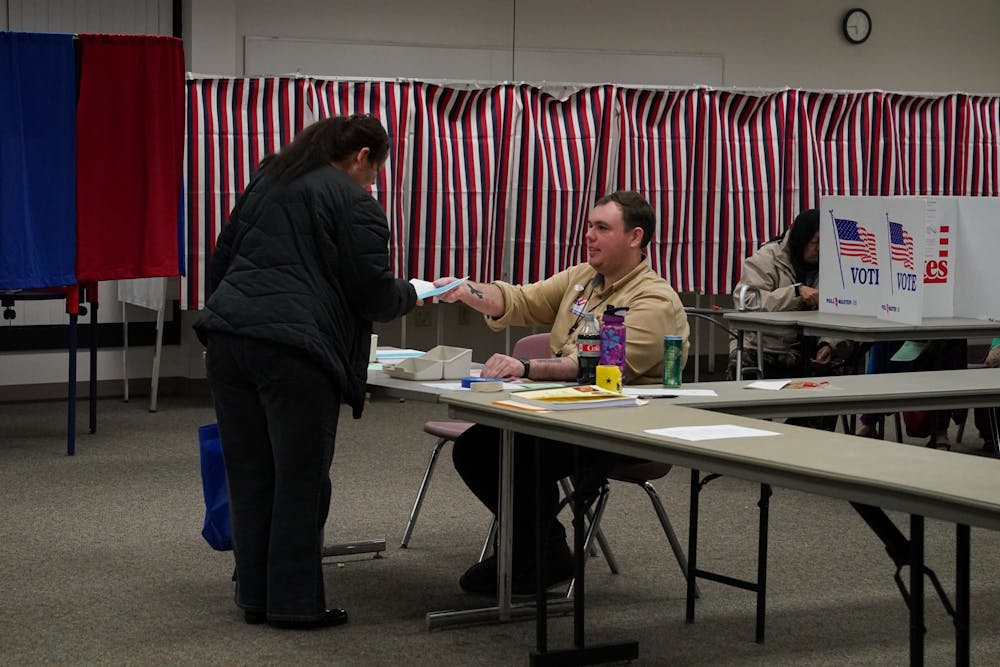Amidst a nationwide poll worker shortage during a historic election year, several Penn alumni founded an organization to encourage healthy, low-risk candidates to sign up to be poll workers.
The Poll Workers Project, a non-partisan organization founded by five Penn alumni, aims to address concerns about the potential impact of COVID-19 on voter disenfranchisement across the country. The average age for poll workers in Philadelphia is 60, so fewer workers are signing up for fear of contracting the virus. This shortage could lead to extremely long lines at the polls, as well as the forced closure of certain poll locations.
Philadelphia, ranked as one of the top 10 cities with the greatest need for poll workers, has launched several initiatives to try and counter this shortage, most notably in the increase in compensation for workers. Poll workers will receive $50 to attend a half-an-hour training session, and another $200 for working Election Day, which is the current maximum amount permitted by the state of Pennsylvania, according to Philly Voice. But even so, the city is roughly 4,000 workers short of what will be needed to ensure that all polling locations can function for Election Day.
Though COVID-19 affects those of all ages, pre-existing conditions pose unique circumstances of risk. Young people, on average, have significantly lower COVID-19 infection and mortality rates in comparison with those ages 60 and up. For this reason, the Poll Workers Project is urging college students across the country to step up if they are able, and sign up to work the polls this coming Election Day.
“We’re working to make an actual difference, and you know, sometimes it can just feel like a drop in the bucket. But working the polls presents an actual opportunity for people to make a tangible difference within their own communities,” 2014 College graduate and Co-Founder of the Poll Workers Project Noah Goldstein said. “One poll worker, on average, can help around 90 people to cast their vote. And that’s huge.”
Goldstein said that the potential for disenfranchisement posed by the pandemic could be particularly applicable to Philadelphia, given the socioeconomic and racial demographics of the city. According to the Census Bureau, 43.6% of the city identifies as Black or African American, and 15.2% identify as Hispanic or Latinx. The census also estimates that 24.3 percent of the city lives in poverty.
According to a report by the Brennan Center for Justice, Black and Latino voters, on average, face longer wait times at the polls in comparison to their white counterparts. Because of the increased risk of COVID-19 transmission associated with these hours-long wait times, these voters could face a larger risk from a health standpoint as well. Black Philadelphians have also been shown to be dying of coronavirus at a higher rate than other racial groups in the city, according to The Philadelphia Inquirer.
“Philadelphia, being a plurality city of color, with many of its residents living under the poverty level, an opportunity to get engaged like this could really have an effect on people that might otherwise be flat-out disenfranchised,” Goldstein said.
RELATED:
Penn Dems will deliver voting materials to over 500 off-campus residences to boost turnout
Penn will not excuse student poll workers from class on Election Day
“[Working the polls is] a very personal decision, and we really understand that,” 2016 College graduate and Co-Founder of the Poll Workers Project James Lengyel said. “We don’t want anyone to wake up on November 4 and think ‘I didn’t do enough to be part of this.’ It’s a great way to be involved, and make a direct impact.”
Student groups within Penn’s own campus are formally encouraging students that are able to work the polls to sign up as well. Penn Leads the Vote Co-Director and College junior Harrison Feinman said his club hopes that Penn students will take advantage of the opportunity.
“It’s really important that young people take this initiative into their own hands, and with the pay raise in Philly, I mean, $250, it’s an absurd amount of money, and it’s a good absurd,” Feinman said. “This is a win-win situation in which students can help their communities, especially around Penn, and make a lot of money in the process.”
Students can find more information on how to become poll workers, including steps to sign up and the qualifications necessary in their respective local polling place on PLTV's website, as well as Power the Polls, an online resource recommend by the Poll Workers Project.
Correction: A previous version of this article incorrectly called the organization the Penn alumni founded Power the Polls, when in fact their organization is called The Poll Workers Project. The DP regrets the error.









